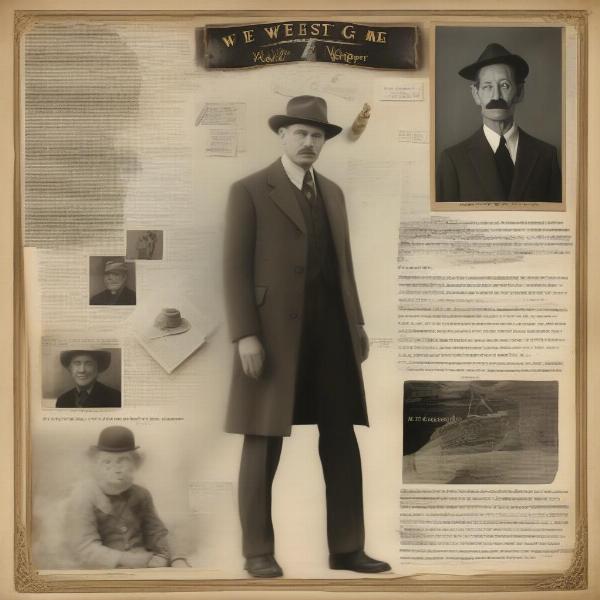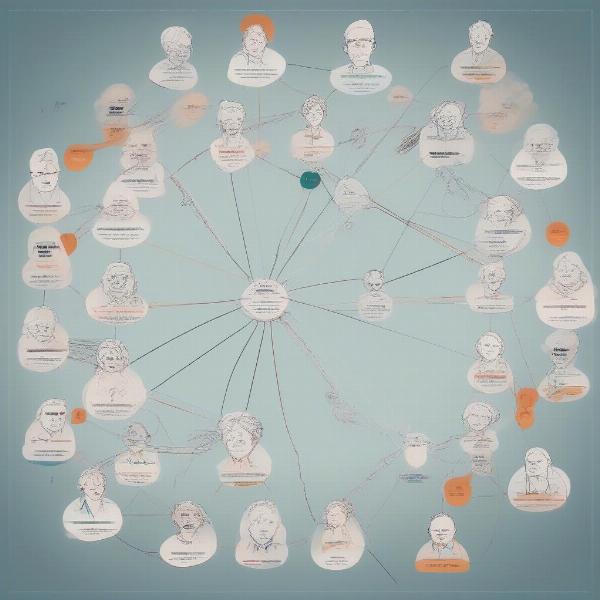The mystery surrounding Sam Westing’s supposed murder in Ellen Raskin’s The Westing Game is a captivating puzzle. Who murdered Sam Westing? The answer is surprising: no one. The entire premise of the game is a carefully constructed ruse. Sam Westing, a master of disguise and gamesmanship, orchestrates his own “murder” to bring together a diverse group of tenants and challenge them to unravel his intricate game. The truth is, Sam Westing is alive and well, disguised as one of the characters, observing the players as they navigate his elaborate scheme.
Unraveling the Mystery: There is No Murder
The brilliance of The Westing Game lies in its misdirection. From the beginning, the tenants are led to believe that Sam Westing has been murdered. This sets the stage for a thrilling investigation, complete with clues, red herrings, and a hefty inheritance at stake. The players are so consumed by the idea of a murder that they overlook the true nature of the game. They focus on finding the “killer” amongst themselves, suspecting each other and forming alliances. However, as the game progresses, the truth slowly emerges: there is no murderer.
The Real Game: Finding Sam Westing
Instead of a murder mystery, The Westing Game is a game of identity and self-discovery. Westing, disguised as Barney Northrup, Sandy McSouthers, and Julian R. Eastman, uses the game to observe and guide the players towards growth and fulfillment. He challenges them to confront their pasts, overcome their insecurities, and ultimately, find themselves. The real challenge isn’t to find a killer, but to understand Sam Westing’s true intentions and to find him hidden among them. The game’s clues lead the players not to a murderer, but to Westing himself, in his various disguises.
 The Westing Game Clues and Disguises
The Westing Game Clues and Disguises
Why the Murder Misdirection?
Westing’s elaborate scheme, built around a fictitious murder, serves several purposes. The premise of a murder immediately grabs the players’ attention and motivates them to participate. The mystery creates a sense of urgency and excitement, driving them to uncover the “truth.” This intense focus allows Westing to manipulate the game and guide the players towards his ultimate goal: their personal growth and happiness. The false murder is the catalyst for the entire game, providing the framework for Westing’s complex plan.
The Role of the Clues
The clues provided in The Westing Game are crucial to understanding the narrative. They are not designed to expose a murderer, but rather to reveal connections between the characters and to point towards Westing’s true identity. Each clue, seemingly unrelated, contributes to a larger puzzle, slowly revealing the truth behind Westing’s game. The clues are designed to encourage collaboration and communication, forcing the players to work together and learn from each other.
 Westing Game Characters and Connections
Westing Game Characters and Connections
Westing’s Endgame
Sam Westing’s “murder” is a testament to his love of games and his desire to leave a lasting impact on the lives of the tenants. He uses the inheritance as a motivator, but his true gift is the opportunity for self-discovery and growth. By the end of the game, the players understand that the real prize is not the money, but the lessons they have learned and the relationships they have formed. They discover that Sam Westing wasn’t murdered, but rather, he was reborn through the transformative experience he created.
“The true measure of a game isn’t the winner, but the impact it has on the players.” – Professor Alistair Finch, Game Theory Specialist
The Legacy of The Westing Game
The Westing Game remains a beloved novel because of its ingenious plot and its focus on human connection. The absence of a real murder allows the story to explore themes of identity, community, and the power of games. The novel teaches readers to look beyond the surface and to appreciate the complexities of human nature. The game itself, though fictional, offers valuable lessons about strategy, collaboration, and the importance of understanding different perspectives.
 The Westing Game Legacy and Impact
The Westing Game Legacy and Impact
Beyond the Game: Exploring Themes of Identity
The unique premise of The Westing Game, with its fake murder, allows the story to delve into deeper themes of identity and self-discovery. The characters are forced to confront their own preconceptions and biases as they navigate the game. They learn to see each other, and themselves, in a new light. The game becomes a catalyst for personal growth, pushing the characters to embrace their true selves.
“Westing’s game is more than just a game; it’s a mirror reflecting the hidden truths within each player.” – Dr. Evelyn Reed, Literary Analyst
Conclusion
The question “Who Murdered Sam Westing In The Westing Game?” is a clever trick. The answer is no one. Sam Westing orchestrated his disappearance as a complex game of self-discovery for the residents of Sunset Towers. The game’s focus is not on solving a murder, but on understanding the intricate connections between the characters and the motivations behind Westing’s elaborate plan. So, the next time you pick up The Westing Game, remember that the real mystery lies not in who killed Sam Westing, but in the journey the characters take to find themselves. Share this article with fellow Westing Game enthusiasts and let’s continue the conversation in the comments below!
FAQ
- Was Sam Westing really murdered? No, Sam Westing faked his own death to orchestrate the game.
- Why did Sam Westing create the game? He wanted to observe and guide the tenants towards personal growth and fulfillment.
- What is the significance of the clues in the game? The clues are designed to reveal connections between the characters and point towards Westing’s true identity.
- Who wins The Westing Game? Ultimately, all the players win in their own way through self-discovery and growth.
- What is the main theme of The Westing Game? The novel explores themes of identity, community, and the power of games.
- Is The Westing Game suitable for young readers? Yes, it is a popular choice for children and young adults.
- Where can I learn more about The Westing Game? Numerous online resources, book clubs, and literary analyses are available to delve deeper into the novel.

